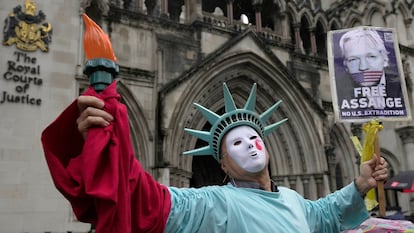US considering plea deal for Julian Assange if he admits guilt, according to ‘The Wall Street Journal’
The agreement on a lesser charge of mishandling classified information would avoid the extradition of the WikiLeaks co-founder, who faces 175 years in prison

The United States Department of Justice is studying the possibility of reducing the charges against Julian Assange in exchange for the co-founder of WikiLeaks admitting his guilt, according to The Wall Street Journal, which cites “people familiar with the matter.” The purpose of such a deal would be to avoid the extradition of the Australian editor and publisher, who has been held in the Belmarsh maximum-security prison on the outskirts of London for five years.
Joe Biden’s administration maintains formal charges against Assange promoted by his predecessor, Donald Trump, for 17 crimes under the Espionage Act and one of conspiracy to commit computer intrusion. The former hacker could face 175 years in prison in the United States for the leak of more than 250,000 classified documents from the U.S. State Department in November 2010.
Assange’s lawyer in the United States, Barry J. Pollack, responded to The Wall Street Journal report with a brief statement: “It is inappropriate for Mr. Assange’s lawyers to comment while his case is before the U.K. High Court other than to say we have been given no indication that the Department of Justice intends to resolve the case and the United States is continuing with as much determination as ever to seek his extradition on all 18 charges, exposing him to 175 years in prison.”
The warning that “it is inappropriate” to make any comment puts a precautionary cushion on the subsequent denial of any agreement, as it is possible it is an extrajudicial negotiation.
Two British judges, Victoria Sharp and Jeremy Johnson, will decide in the coming weeks whether to grant the co-founder of WikiLeaks one last chance to legally argue his case before the U.K. justice system, or whether to give the final green light to his extradition to the United States. The hearing to resolve this prior request for the possibility of appeal presented by Assange’s legal team — held over two sessions in mid-February — once again raised global attention over his situation and generated a widespread campaign in defense of press freedom. The growing pressure in favor of Assange’s release is not so much directed towards the magistrates who have been passing a hot potato between them, but towards the American and British governments.
If the Department of Justice and Assange’s lawyers reach the agreement posited by The Wall Street Journal, his hypothetical admission of the less serious crime of mishandling classified information would result in his immediate release as the five years he has spent in Belmarsh prison would count as time already served.
In an interview with EL PAÍS at the end of the hearing in London, Stella Assange explained that her husband’s health has deteriorated and that she feared for his life if he is handed over to the United States. “He could die because they could impose the death penalty [...] or he may die because he is subjected to prison conditions so brutal that they lead him to commit suicide,” she said.
Sign up for our weekly newsletter to get more English-language news coverage from EL PAÍS USA Edition
Tu suscripción se está usando en otro dispositivo
¿Quieres añadir otro usuario a tu suscripción?
Si continúas leyendo en este dispositivo, no se podrá leer en el otro.
FlechaTu suscripción se está usando en otro dispositivo y solo puedes acceder a EL PAÍS desde un dispositivo a la vez.
Si quieres compartir tu cuenta, cambia tu suscripción a la modalidad Premium, así podrás añadir otro usuario. Cada uno accederá con su propia cuenta de email, lo que os permitirá personalizar vuestra experiencia en EL PAÍS.
¿Tienes una suscripción de empresa? Accede aquí para contratar más cuentas.
En el caso de no saber quién está usando tu cuenta, te recomendamos cambiar tu contraseña aquí.
Si decides continuar compartiendo tu cuenta, este mensaje se mostrará en tu dispositivo y en el de la otra persona que está usando tu cuenta de forma indefinida, afectando a tu experiencia de lectura. Puedes consultar aquí los términos y condiciones de la suscripción digital.









































